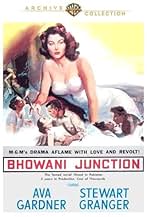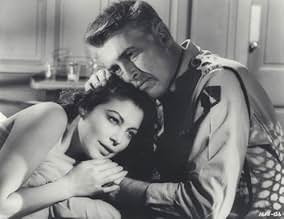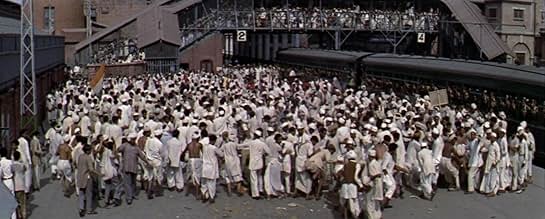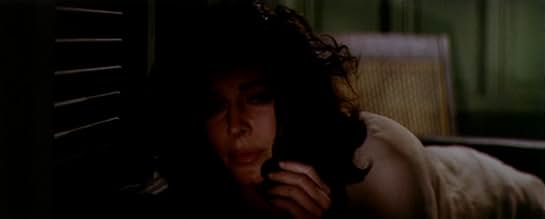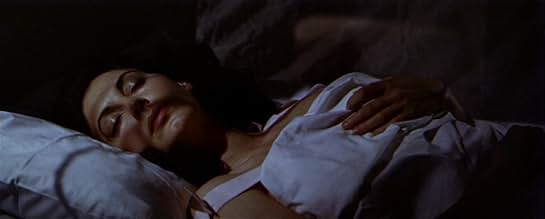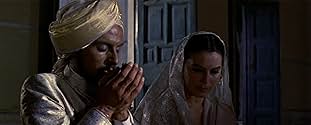IMDb रेटिंग
6.4/10
2.2 हज़ार
आपकी रेटिंग
अपनी भाषा में प्लॉट जोड़ेंAnglo-Indian Victoria Jones seeks her true identity amid the chaos of the British withdrawal from India.Anglo-Indian Victoria Jones seeks her true identity amid the chaos of the British withdrawal from India.Anglo-Indian Victoria Jones seeks her true identity amid the chaos of the British withdrawal from India.
- निर्देशक
- लेखक
- स्टार
- 1 BAFTA अवार्ड के लिए नामांकित
- 2 कुल नामांकन
Ronald Adam
- General Ackerby
- (बिना क्रेडिट के)
Anthony Bushell
- Lanson
- (बिना क्रेडिट के)
Eric Corrie
- Man-at-Arms
- (बिना क्रेडिट के)
George Cukor
- Man on Train
- (बिना क्रेडिट के)
Roger Delgado
- Train Driver
- (बिना क्रेडिट के)
Dharma Emmanuel
- Sentry
- (बिना क्रेडिट के)
Raymond Francis
- Captain Cumberly
- (बिना क्रेडिट के)
फ़ीचर्ड समीक्षाएं
Stars are the primary reason for me to watch old movies, because they just don't make them like that anymore. 'Bowani Junction' provides some of the best; Ava Gardner is so irresistibly attractive in this movie that watching her along is worth every penny spent for buying the copy. Better yet, other things in the film are also good. Granger, playing a more realistic role, is at his best elements as a daring arrogant English Col., match nicely with the beautiful Gardner as a romantic couple. Most of the Indian characters are well portrayed and I love movie with a historical background . The story is complicated ,yet well told and paced. The characters are interesting and well presented. Over all, this is Cukor's movie at its usual fine standard.
This one is not to miss for fans of Granger, Gardner, and Hollywood oldies.
This one is not to miss for fans of Granger, Gardner, and Hollywood oldies.
During the chaotic final days of British rule in northwest India in 1947, the beautiful daughter (Gardner) of an English train engineer and an Indian mother struggles to find her identity while pursued by three men: a rail-traffic superintendent (Bill Travers), his Sikh subordinate (Francis Matthews) and a British colonel (Stewart Granger). Meanwhile Indian supporters of Mahatma Gandhi campaign for independence while Communists, led by a revolutionary called Davay (Peter Illing), fuel unrest.
"Bhowani Junction" (1956) is an exotic drama with adventure elements similar to the future "A Passage to India" (1985), although not as good as that one. It features most of the elements you'd think of when India comes to mind - never-ending throngs of people in (usually) white garb, trains, street commotion, etc.
Ava is beautiful, Granger makes for a stalwart male protagonist, the locations are authentic and the historical setting is interesting. But I rolled my eyes at the subplot regarding a certain person feeling guilty about something, which didn't make sense since what that person did was in self-defense and the perpetrator was an ignoble scumbag.
The movie runs 1 hour, 50 minutes, and was shot in Lahore, Pakistan, which is just across the border from northwestern India; the train wreck sequence was done 35 miles outside London to the southwest; another sequence was shot at Tram Tunnel, Kingsway, London, while studio stuff was done at the MGM British Studios just north of the city.
GRADE: B-/C+
"Bhowani Junction" (1956) is an exotic drama with adventure elements similar to the future "A Passage to India" (1985), although not as good as that one. It features most of the elements you'd think of when India comes to mind - never-ending throngs of people in (usually) white garb, trains, street commotion, etc.
Ava is beautiful, Granger makes for a stalwart male protagonist, the locations are authentic and the historical setting is interesting. But I rolled my eyes at the subplot regarding a certain person feeling guilty about something, which didn't make sense since what that person did was in self-defense and the perpetrator was an ignoble scumbag.
The movie runs 1 hour, 50 minutes, and was shot in Lahore, Pakistan, which is just across the border from northwestern India; the train wreck sequence was done 35 miles outside London to the southwest; another sequence was shot at Tram Tunnel, Kingsway, London, while studio stuff was done at the MGM British Studios just north of the city.
GRADE: B-/C+
Well, I've always sort of identified myself as an AngloBanglo.
My dad was born in Lahore in 1929 and my grandparents left Karachi in 1965 almost 20 years after partition because the Muslims had made it impossible for my Nana to continue to run her private school.
The returned to England like so many AngloBanglos where they were too Indian for the white and not Indian enough for the Indians.
Just like they were back in what was then Pakistan and by some account, India itself.
You have to remember that at this point, as depicted in the film, 1947 was the cusp of partition and violence was everywhere. My grandfather told me graphic stories of entire trains of people slaughtered he had witnessed.
Ava Gardner's character has to choose which side she is on but for many AngloBanglos the struggle goes on. We are neither brown enough for the browns, nor white enough for the whites. I now live in Canada but I self identify as English.
The sub text in George Cukor's story has lost some of it's impact over time because few remember the upheaval of partition but for some of us, it bring it back into focus.
More interesting to me is that it was released the year I was born, in England, in 1956.
My dad was born in Lahore in 1929 and my grandparents left Karachi in 1965 almost 20 years after partition because the Muslims had made it impossible for my Nana to continue to run her private school.
The returned to England like so many AngloBanglos where they were too Indian for the white and not Indian enough for the Indians.
Just like they were back in what was then Pakistan and by some account, India itself.
You have to remember that at this point, as depicted in the film, 1947 was the cusp of partition and violence was everywhere. My grandfather told me graphic stories of entire trains of people slaughtered he had witnessed.
Ava Gardner's character has to choose which side she is on but for many AngloBanglos the struggle goes on. We are neither brown enough for the browns, nor white enough for the whites. I now live in Canada but I self identify as English.
The sub text in George Cukor's story has lost some of it's impact over time because few remember the upheaval of partition but for some of us, it bring it back into focus.
More interesting to me is that it was released the year I was born, in England, in 1956.
Loving drama set in the year is 1947, when the British are on the verge of giving independence India
Spectacular screen translation of John Masters' novel carried out by M-G-M set in post -colonial India. This is a drama aflame with Love And Revolt . Anglo-Indian Victoria Jones seeks her true identity amid the chaos of the British withdrawal from India . Meanwhile , Indu Victoria to be courted by three suitors , Col. Rodney Savage (Stewart Granger , this role gave hem a strenuous time along with Scaramouche , Beau Brummell and Moonfleet) , Ranjit Kasel (Francis Matthews) and Patrick Taylor (Bill Travers , though Sabu tested for, and was nearly cast in the role) .
This dramatic picture contains a meaty plot , thrills , unrest , violence , love and historical events dealing with pre-independence India . This colorful picture gave Ava Gardner , Stewart Granger and co-stars a good time . Stewart Granger is fine as a colonel who falls in love for Ava . Gorgeous Ava Gardner as a half-English , half-Indian woman who is torn between the British officer she loves and her country . Gardner was trampled on by more than 200 native extras , then shaken and bruised in a staged fight with soldiers ; some years later , Ava declared it the toughest picture she ever worked on . Support cast is frankly well , such as Abraham Sofaer as Surabhai , Lionel Jeffries as Lt. Graham McDaniel , Freda Jackson as Sandani , Peter Illing as Ghanshyam and Francis Matthews who said in interviews that huge chunks of his part ended up on the cutting room floor ; in addition , Edward Chapman was hired to play Jones after the scenes had been shot with another actor playing the role . Furthermore , a right make-up to appear American actors like Indian people .
Evocative as well as glowing cinematography by Freddie Young shot on location in Pakistan . The filming took place in Pakistan rather than India for political reasons due to the scenes of Hindu terrorism including against Ghandi himself. Emotive and intense musical score by the classic Miklos Rozsa . The motion picture was well directed by George Cukor , though contains some flaws . This excellent filmmaker directed 20 different actors in Oscar-nominated performances . Cukor enjoyed a successful working partnership with Katharine Hepburn, directing her in ten films over a period of 47 years such as ¨Little women¨, ¨The Philadelphia story¨, ¨Adam's rib¨ , ¨Pat and Mike¨, among others . He was often regarded as a "women's director" because his films frequently are centered around strong female characters . Cukor directed many adaptations of books & plays and was known to be particularly skilled at interpreting stage plays for the screen .
This dramatic picture contains a meaty plot , thrills , unrest , violence , love and historical events dealing with pre-independence India . This colorful picture gave Ava Gardner , Stewart Granger and co-stars a good time . Stewart Granger is fine as a colonel who falls in love for Ava . Gorgeous Ava Gardner as a half-English , half-Indian woman who is torn between the British officer she loves and her country . Gardner was trampled on by more than 200 native extras , then shaken and bruised in a staged fight with soldiers ; some years later , Ava declared it the toughest picture she ever worked on . Support cast is frankly well , such as Abraham Sofaer as Surabhai , Lionel Jeffries as Lt. Graham McDaniel , Freda Jackson as Sandani , Peter Illing as Ghanshyam and Francis Matthews who said in interviews that huge chunks of his part ended up on the cutting room floor ; in addition , Edward Chapman was hired to play Jones after the scenes had been shot with another actor playing the role . Furthermore , a right make-up to appear American actors like Indian people .
Evocative as well as glowing cinematography by Freddie Young shot on location in Pakistan . The filming took place in Pakistan rather than India for political reasons due to the scenes of Hindu terrorism including against Ghandi himself. Emotive and intense musical score by the classic Miklos Rozsa . The motion picture was well directed by George Cukor , though contains some flaws . This excellent filmmaker directed 20 different actors in Oscar-nominated performances . Cukor enjoyed a successful working partnership with Katharine Hepburn, directing her in ten films over a period of 47 years such as ¨Little women¨, ¨The Philadelphia story¨, ¨Adam's rib¨ , ¨Pat and Mike¨, among others . He was often regarded as a "women's director" because his films frequently are centered around strong female characters . Cukor directed many adaptations of books & plays and was known to be particularly skilled at interpreting stage plays for the screen .
Produced barely a handful of years after the tumultuous period in question, the film delves further into events and attitudes that would have been comparatively unfamiliar to North American audiences - perhaps explaining, in part, its middling box office performance.
One can only speculate as to whether the project was part of a Cold War ploy to woo India away from its affection for Russia; however, dialogue early on does make specific reference to worries about Russian influence. If there's any validity to that speculation, then its ambitions extended beyond the box office (and might have been realized..?).
I agree with those commending director Cukor for his handling of the wide screen spectacle and action. I suspect that Richard Attenborough took notes from Cukor's visual approach in pre-planning his "Gandhi." Yes, other directors (e.g., Victor Fleming, Gone With the Wind, to mention but one) achieved more memorable tableaux; but this was an honourable entry in a still-evolving format at the time.
I'll yield to others' opinions on the performances - with the exception that I found Bill Travers's character and his portrayal were a one-note annoyance throughout. I mean, at least get a dialogue coach and find a credible accent, already!
It would be interesting to recover Cukor's original cut of the film, notwithstanding the apparently negative audience reactions at the time. The voice over post-facto narrative technique the studio imposed was hackneyed even then.
One can only speculate as to whether the project was part of a Cold War ploy to woo India away from its affection for Russia; however, dialogue early on does make specific reference to worries about Russian influence. If there's any validity to that speculation, then its ambitions extended beyond the box office (and might have been realized..?).
I agree with those commending director Cukor for his handling of the wide screen spectacle and action. I suspect that Richard Attenborough took notes from Cukor's visual approach in pre-planning his "Gandhi." Yes, other directors (e.g., Victor Fleming, Gone With the Wind, to mention but one) achieved more memorable tableaux; but this was an honourable entry in a still-evolving format at the time.
I'll yield to others' opinions on the performances - with the exception that I found Bill Travers's character and his portrayal were a one-note annoyance throughout. I mean, at least get a dialogue coach and find a credible accent, already!
It would be interesting to recover Cukor's original cut of the film, notwithstanding the apparently negative audience reactions at the time. The voice over post-facto narrative technique the studio imposed was hackneyed even then.
क्या आपको पता है
- ट्रिवियाMGM originally planned to film Bhowani Junction on location in India. That is, until the Indian government started making demands seeking script approval and a big tax payment of 12% of the film's worldwide net profit. MGM changed their plans and decided to film instead in Pakistan - whose government was more accommodating and less demanding of the studio. And this made the picture the first Hollywood film produced in that country.
- गूफ़When Savage is first in Taylor's office giving him orders about the trains, he says, "One of you will have to be in close touch with me at all times so that my trolley patrols do not run into unscheduled trains." He says the word "unscheduled" using the American "sk" pronunciation, but as an Englishman he would have pronounced it using the British "sh" sound.
- भाव
Victoria Jones: Why should you stand by me? You're not an Anglo-Indian?
Col. Rodney Savage: You're an officer under my command.
Victoria Jones: Say, eh, I, all these weeks I've known you, this is the first time I've realized there's a human being inside you somewhere.
Col. Rodney Savage: Oh, he's still there, is he? Good. Then, there's hope for us all.
- कनेक्शनEdited into Histoire(s) du cinéma: Une histoire seule (1989)
टॉप पसंद
रेटिंग देने के लिए साइन-इन करें और वैयक्तिकृत सुझावों के लिए वॉचलिस्ट करें
- How long is Bhowani Junction?Alexa द्वारा संचालित
विवरण
बॉक्स ऑफ़िस
- बजट
- $36,37,000(अनुमानित)
- दुनिया भर में सकल
- $3,657
- चलने की अवधि
- 1 घं 50 मि(110 min)
- पक्ष अनुपात
- 2.35 : 1
इस पेज में योगदान दें
किसी बदलाव का सुझाव दें या अनुपलब्ध कॉन्टेंट जोड़ें


